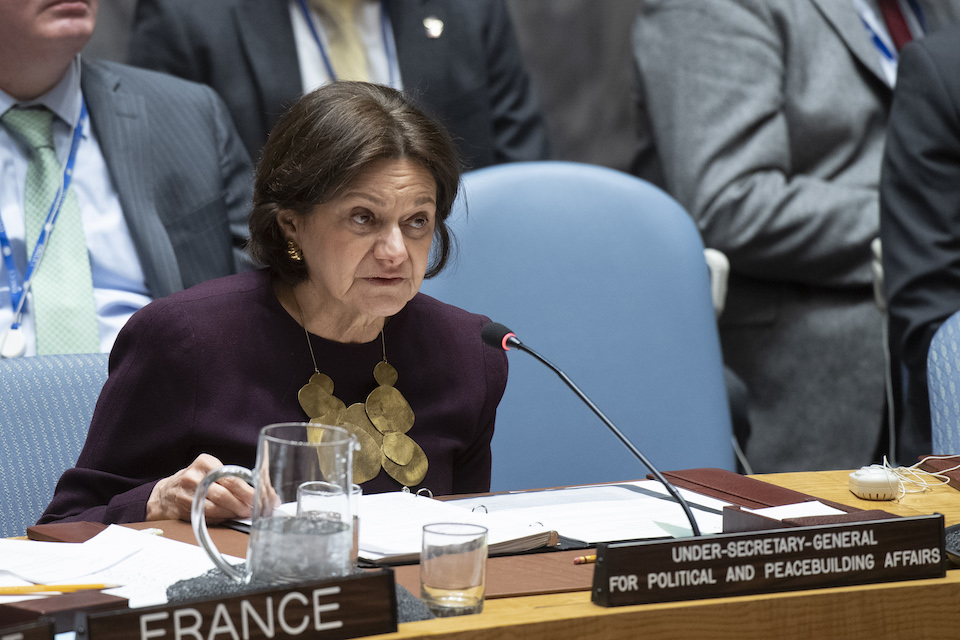The Syrian Regime's Continued Failure to Address Challenges to Peace and Stability
Statement by Ambassador Jonathan Allen, UK Deputy Permanent Representative to UN, at the Security Council Briefing on Syria

Thank you very much indeed Mr President and to Under-Secretary-General Rosemary DiCarlo and Mr Rajasingham for their briefings today.
Mr President, let me start by welcoming the news that over weekend, the final tract of Daesh-held territory was liberated by Syrian Democratic Forces. This is a huge testament to the courage and commitment of those forces and to the work of the Global Coalition against Daesh.
The liberation of Daesh-held areas is not the end of the fight against the group. Daesh retains significant organisational and economic capability with which to pursue its dangerous and pervasive ideology. We remain committed to the enduring defeat of Daesh in the region and globally.
Mr President, other serious challenges also remain. This includes the huge humanitarian challenge at the Al Hol IDP camp following the large influx of people displaced from Baghuz. We commend the United Nations’ efforts to scale up its response and the United Kingdom stands ready to provide further support. Indeed, this financial year, the United Kingdom has allocated over £40 million to address basic life-saving needs across Northeast Syria, where Al Hol camp is located. UK funded partners are doing all they can to support those affected by providing vital services, including healthcare and shelter.
The threat of a humanitarian disaster continues to loom in Idlib, with frequent reports of shelling and airstrikes by the regime and its backers, which have caused the death of over 90 people and the displacement of 72,000 people since February. We continue to support Turkey’s ongoing efforts to prevent a reckless military offensive by the Syrian regime in northwest Syria. We call on Russia and Iran as Astana Guarantors alongside Turkey to ensure that the ceasefire is respected.
But the threat to the Syrian people and the stability of Syria is not just in the regime’s actions. It is in its failure to take the steps needed to address the immense challenges to peace and stability.
Mr President, the Syrian economy has shrunk by more than 60% since the start of the conflict and the Syrian dollar has depreciated against the US dollar by over 90%. Six out of ten Syrians now live in extreme poverty. Over 13 million Syrians are in need of humanitarian assistance, over 11 million have been displaced and some 400,000 are dead. Up to 100,000 have been detained or have disappeared.
The conflict and the crisis in Syria will not end unless the root causes of the conflict are addressed. There will be no stability without the creation of a safe environment. Refugees will not return without credible assurances for their safety. Radicalisation and unrest will not end without action being taken to resolve failures of governance, including the lack of basic service provision, economic opportunity and representative institutions.
M President, the Security Council, in resolution 2254, unanimously set out a comprehensive mechanism to deliver an alternative, inclusive, representative way forward. UN Special Envoy Geir Pedersen and his team continue to command our full support in seeking to find a solution to the conflict. The United Kingdom, along with others, as has already been said today, remains committed to addressing the humanitarian needs of the people of Syria. At the Brussels Conference, the United Kingdom pledged £400 million – or $530 million. And indeed we have mobilised over £2.81 billion to the Syrian Crisis since 2012 – that’s over £3.7 billion. That’s our largest ever response. We and others have indicated on numerous occasions our readiness to assist Syria with reconstruction, should there be a negotiated political settlement.
And yet, Mr President, the Assad regime continues to refuse to change its behaviour and to follow the course of action which gave rise to the conflict in the first place. It continues to seize the assets and property of citizens and to engage in widespread and arbitrary arrests. It continues to provide limited or no basic services to those in need, and to interfere with UN efforts to fill this gap, including by stalling aid convoys desperately needed to the Rukban IDP camp. The Syrian regime continues to spread lies and disinformation whilst failing to uphold its responsibilities under the Chemical Weapons Convention. It continues to refuse to engage in the United Nations’ efforts under Resolution 2254.
No progress can be made without a change in attitude and behaviour by the Syrian regime. It is time, Mr President, for a government in Syria that will do right by its people.
Thank you, Mr President.